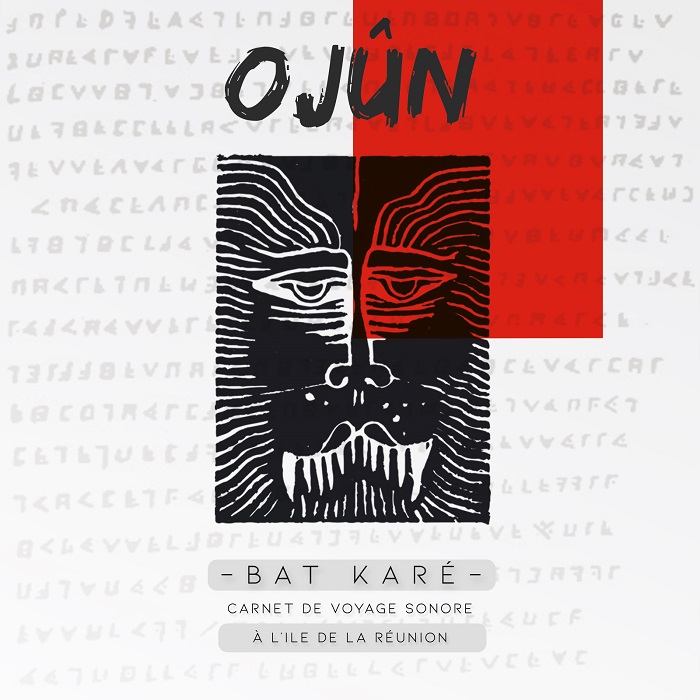Ojûn slips his multi-instrumentalist talents between field recordings and electronic orchestrations to pay tribute to the Reunion Island, where he grew up. PAM invites you to listen to a preview track via this unique interview.
When it comes to talking about music and multiculturalism, Guillaume Chartin is not the type to hide. Passionate about ethnomusicology, this studious artist has set up the project Ojûn – which means shaman in Yakut language – as a pretext to highlight his musical travels. Inhabited by a certain nostalgia, the Frenchman from the Breton region returned to the Reunion Island to walk in the footsteps of his childhood. All he had was his backpack and enough to record the whispers of the intense island’s sounds. But beyond his faithful companions, the guitar and clarinet, Ojûn doesn’t hesitate to inject and refine the sounds of Reunion island and its people along with the world’s own instruments in the dense, direct and melodic experimental universe of Bat Karé. To give it an even more mystical, yet palpable, he puts the practice of field recording at the very heart of the project, capturing the sounds of the street and surrounding nature to blend them in organic compositions that are rich in meaning. Here is a discussion based around this sound travel diary and the chance to listen to the exclusive new track “Tout Monde.”
You grew up on Reunion Island. Is that the reason why you decided to go back there for this project?
Yes, indeed. I grew up in Saint Pierre until I was seven years old. It was an experience that left a deep impression on me. Since then I have never stopped nourishing my passion for Reunionese culture through music, gastronomy and history! When the wish to create an album on the road came up, it was therefore logical for me to go back to this territory where my first memories remain.
So is Bat Kare a kind of homage?
Yes, I was also moved by the desire to pay tribute to this territory where togetherness and multiculturalism are not myths and are observed every day. Therefore, it corresponds well to my artistic purpose, which is to talk about the creolization of the world.
We are talking about field recordings. What kind of sounds can we find in your compositions, beyond the very explicit interludes? What did you go looking for?
I used field recordings as a way to stay in touch with the reality I lived, to center myself, but also as a way to build a narrative. Although my music is instrumental, and therefore there is no text to hold on to, I felt it was important to contextualize this creation in order to invite people to wander around, if not physically then at least psychologically. In my compositions, I used field recordings in a more or less explicit way. In the song “Gran Merkal” for example, we can hear birds recorded in Cilaos during a hike I took to the snowy peak. On other compositions, it is necessary to listen more attentively in order to hear these field recordings. For example, on the song “Anamorphosis,” the introduction begins with the recordings of the wind and the sea at Etang Salé. I deliberately put these sounds back in the mix so that they are almost unrecognizable. The objective was above all to leave the door open to all interpretations by not defining the experience too much!
I find your music very melancholic. Does this relate to nostalgia or is it simply the feeling that the island inspires you?
When I was composing this album, I was in a very special period of my life where I needed to express a lot of emotions that were giving me grief. Then I took a look back at my childhood memories from the point of view of adulthood – it’s a page that turns, a short story that is written, so there is undoubtedly sweet nostalgia that can emanate from these compositions. However, I believe that the emotion in which I was writing this album belongs to me, and I hope that everyone will find what they are looking for!
For the first exclusive track, we chose “Tout Monde.” What is the story behind this piece?
Thank you for choosing this piece! For me “Tout Monde” is the song that I found perhaps the most complex to realize. It starts with a blues guitar loop and a hang. Then, I added a kind of maloya roll, kayamb, piker, vocals, synths and a Chinese erhu. So a lot of things! I built this song in such a way that these elements can follow one another, intermingle, appear, then disappear before ending up in a kind of big melting pot where everything cohabits! My objective was to pay homage to Edouard Glissant’s treatise “Le Tout Monde” (The Whole World) and to his fertile thinking! Le Tout Monde is a way of thinking about the interaction of ideas, cultures and people that I find particularly positive because the idea is that each culture values one another in order to create something completely unexpected. That is to say that no matter the place, tradition, or culture in which we live, we are all obliged to take other languages and other cultural processes into account in order to define ourselves. We are therefore very far from the old absolutes of strictly defined identities, since in this globalized world we all carry within us a part of the history of humanity. In short, it is a process of global otherness that I have observed locally on Reunion Island and one that I have tried to transcribe into music on my own terms!
What will be your next audio travel diary?
In the medium term I would like to work around the Ponant islands. I am very attracted by the mystique of lighthouses and the maritime world in the broadest sense! This time I would like to add video and get closer to what Chassol achieves. In the long term, the ultimate project would be to be able to walk in the footsteps of famous explorers such as Ibn Battuta, but all in good time. In the current situation, happy is the man who can know what he will do in three months!
The album Bat Karé will be released on February 12th on the Parisian label 18 heures 48. Pre-order it here.

